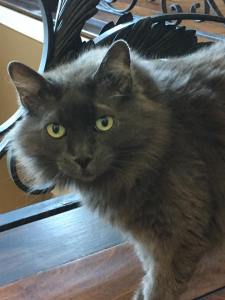*On the eve of the annual conference of the International OCD Foundation (IOCDF), which is taking place in Chicago, I am re-posting this entry from a while back. OCD is a serious disorder that can profoundly affect lives. Knowledge and treatment can make a world of difference.
This is a piece I wrote for myself about three and a half years ago – before I started writing this blog. It reflects the feelings I felt at seeing my son stuck in an OCD ritual, and my struggles with a public that often does not understand that OCD can wreak havoc on lives.

“Good morning!” I say in my most cheery voice as I open the car door and a load of kids tumbles out. I’m working at morning valet at my son’s school, a volunteer position I’ve helped with for the past four years. “Have a great day!” I wish them as they enter school for the day. Across the parking lot, I catch sight of my own son, standing by my car. I can make out the brown curls on the top of his head, which is bowed in prayer. I check my watch – 20 minutes have passed since he began this process. Twenty minutes on a prayer that reasonably ought to take less than five. I can see him repeating the same motions he’s done over and over already. I even think I can see him mouthing the same words.
“Enough already,” I think to myself and begin to walk in his direction.
“Be right back,” I tell my fellow volunteers as I leave my post. When I get to him, he doesn’t acknowledge me. He’s deeply, fervently in prayer.

“Hon,” I ask, “can I help in some way?”
Absolutely no reply. His lips move at rapid-fire pace and he’s planted in place. I put my hand on his shoulder.
“It’s time to go in to school now,” I tell him.
“Mom! I was almost finished! Now I have to start it all over!”
“Honey, you’ve been saying the same prayer over and over for the last 20 minutes. It’s enough. Go join your friends before school starts.”
“I have NOT been saying it over and over. I keep messing up or skipping parts so I have to start again and get it right. I almost had it this time and you interrupted.”
“I don’t think the point is to get it perfectly right. I think it’s about what’s in your heart. You-know-who is just trying to trick you.”
I say this last part in reference to his OCD, which we’ve known he’s had since he was 7. He is nearly 14 now.
“Really? Do you think so?” he says sounding just a little bit hopeful.
“You know that’s the truth. Come on, you can fight this.”
“No, no, no. I have to get it right,” he says. “Just let me do what I have to do.”
“Come on, honey. Stop and go to class.”
“Mom!!!”
“Fine! It’s your OCD. You handle it the way you see fit.”
I throw my arms up in exasperation as I walk back to the waiting line of cars. He goes back to his prayers, trying to finish before he is tardy to class. My heart is heavy as I watch him being caught up in this cycle…trying to get it just perfect and falling short over and over again. I want to make this better for him, want him to be able to go hang with his buddies who are all together before school begins, but I am just an interruption to a process he feels he must go through.
Not long ago I saw a segment of an interview of Howie Mandel by Larry King. Larry was asking Howie about his OCD. At one point Larry looked at Howie and asked, “It’s not a severe mental illness, is it? I mean, it’s not depression.” Larry went on to talk about how we all have a little OCD and how he has all his vitamins and medicine lined up in a certain order and takes them in that order. Howie did his best to explain how OCD can severely impact someone’s life, but I never really felt that the point hit home.
I think Larry’s question reflects what we see in the media about OCD. People with OCD are portrayed as quirky, silly, and super organized. Maybe they are controlling and bothersome. What we miss seeing is the anguish and the suffering. We do not understand how OCD can hold an individual – and entire families – hostage to it. If we can ask the question, “It’s not a severe mental illness, is it?” then we have never witnessed a child with hands so bloody and oozing from over-washing that they wince with pain if anything brushes against them. We have not had a family hike interrupted by the un-ending screams of a child who is certain he is about to die because there may have been a Lyme disease carrying tick on the shrub that brushed up against him. We have never had a sheriff’s deputy come over to us in alarm because our child is screaming so horrifically that they sound like they are being torn limb from limb. We have never had a family meal interrupted over and over because our teenage son has to stop eating to repeat a ritual before he can go on eating. And we have never seen a 13-year-old boy reduced to an exhausted crumpled mass in his mother’s arms after fighting off the demon in his own mind.
“It’s not a severe mental illness, is it?”
Yes, sadly, OCD is a severe mental illness, and it attacks the things that are most precious to a person. People think our family must be very religious because they see our son in prayer all the time. What they do not realize is that the religion our son practices bears little resemblance to any religion we practice in the home – or that anyone practices anywhere for that matter. His practices are born out of a fear that OCD gives him – a fear that something awful will happen if he doesn’t get things just right. What used to be a source of enjoyment, connection and deep meaning for him – and for us all – has become a source of endless doubt and a cycle of torturous repetition that has long lost its original intent.
Yes, there is treatment. There are terrific, highly effective treatments – and my son is in treatment now. He has beaten OCD to a pulp in the past. With this relapse, he is a teenager, in the throes of puberty and determined to be independent of what Mom and Dad want for him. So we wait, with hope that the day will come that he will decide that he loves himself more than he loves fighting us. We wait for the day that he turns his strong-willed nature against the OCD that currently holds him in its grasp and moves toward a freer life. But it’s going to be one heck of a war when it comes because, yes, OCD can be severe – and it grows in strength over time. In the meantime, our family will be here, honing our skills so that we can back this boy up when he is ready to fight.
For more information and to find help, visit the website of the International OCD Foundation: https://iocdf.org/











